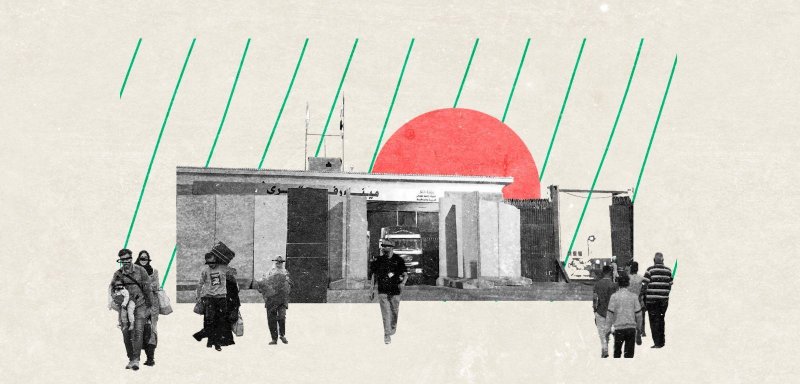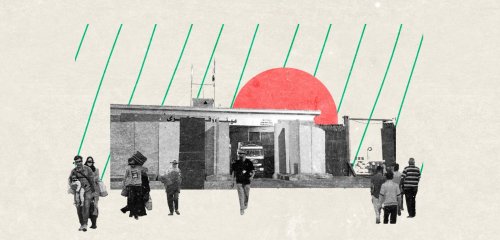The scene at the Rafah Border Crossing remained unchanged for over a month, until an agreement was finally reached to allow Palestinians holding foreign nationalities to cross into Egypt.
On the Egyptian side of the Crossing, a line of cars and buses wait for their passengers to complete the formalities and official procedures required to exit Palestine. Most of the vehicles bear the flags of foreign countries, and are accompanied by the teams and diplomatic missions of their respective embassies and consulates, ushering their nationals to Sinai's Arish for a brief rest before heading to their embassy or the Cairo International Airport to their final destination.
Raseef22 reveals that some of these foreign nationals have opted to stay in Cairo for the time being, as their journeys to safety have yet to be confirmed.
Fear, panic, anxiety, and uneasy anticipation– these are some of the different emotions experienced daily by those who have left Gaza due to their dual nationalities. Many still have family trapped in Gaza. Every moment is filled with terror, as they witness the relentless Israeli bombardment on Gaza, even in the areas designated as “safe” by the Israeli army.
Fear, panic, anxiety, and uneasy anticipation– these are some of the different emotions experienced daily by those who have left Gaza due to their dual nationalities. Many of them still have family trapped in Gaza
Suheir Abdul Rahman, a 50-year-old holding both Palestinian and Canadian citizenship, returned to Gaza from Canada 12 years ago. She never thought of leaving, despite the recurring Israeli attacks over the years. This time is different. Abdul Rahman decided to return to Canada in order to protect the lives of her children and grandchildren. However, her efforts have not been entirely successful.
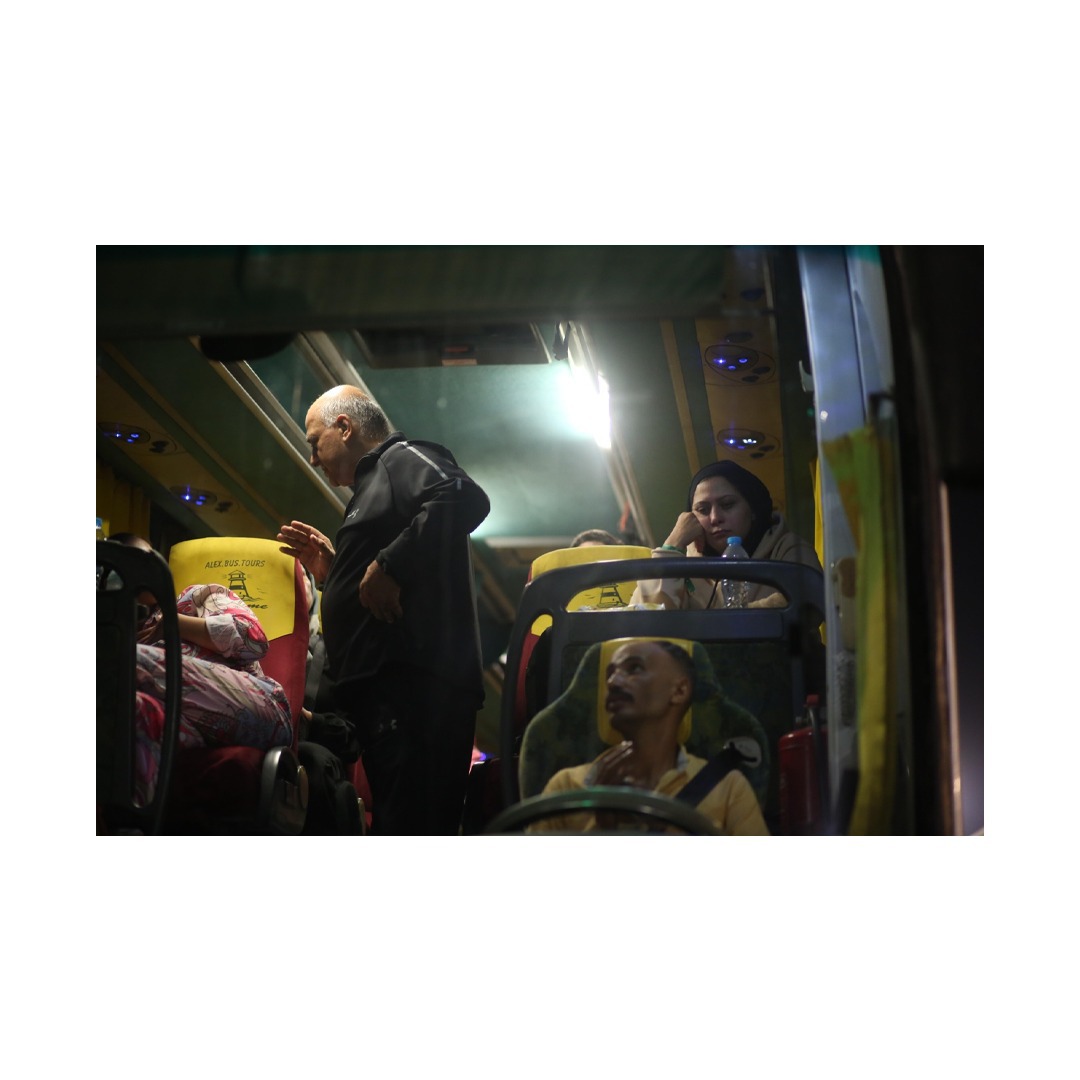 Palestinians with dual citizenship fleeing for their lives arrive in Egypt via the Rafah Border Crossing — Photography by Ayat Al-Habbal
Palestinians with dual citizenship fleeing for their lives arrive in Egypt via the Rafah Border Crossing — Photography by Ayat Al-Habbal
Days of hell
Abdul Rahman finally left Gaza through the Rafah Crossing after witnessing 36 days of relentless Israeli aggression. During that time, she lost 65 members of her family, in both North Gaza and South Gaza. She tells Raseef22 that “there is no safe place.” She left with her son, his wife, and her 4-month-old grandson, as well as her daughter and her daughter's husband– all Canadian nationals. However, only a fraction of her large family was able to leave, while the rest, not holding other nationalities, remain trapped under heavy bombardment. “I lived in Gaza through the wars in 2012, 2014, and 2020, and never thought of leaving. But this war is more brutal than anything we have seen previously.”
She spoke through tears, her face showing extreme fatigue. “The occupation told us to leave the north and move south. I was displaced with my family, we lost our home, and remained in the same clothes we left with for 36 days. We lived with 15 other families in the same house.”
Suheir witnessed 36 days of relentless aggression before she was finally able to leave through the Rafah crossing to Egypt. During those days, she lost 65 members of her family, both in the north and the south of the Strip.
For a while, Abdul Rahman and her family remained near the crossing, attempting to leave Gaza every day. During this time, the Israeli army bombed the Rafah Crossing more than once. She tells Raseef22, “We have lived through horror unlike anything we’ve seen before. There is no rest or peace anymore. I forgot all my familiar surroundings, and as soon as I could, I began to prepare my exit with the support of the Canadian embassy.” She added, “I left just to ensure the safety of my son and grandson, but we will return because this is our land, and we won't abandon it.”
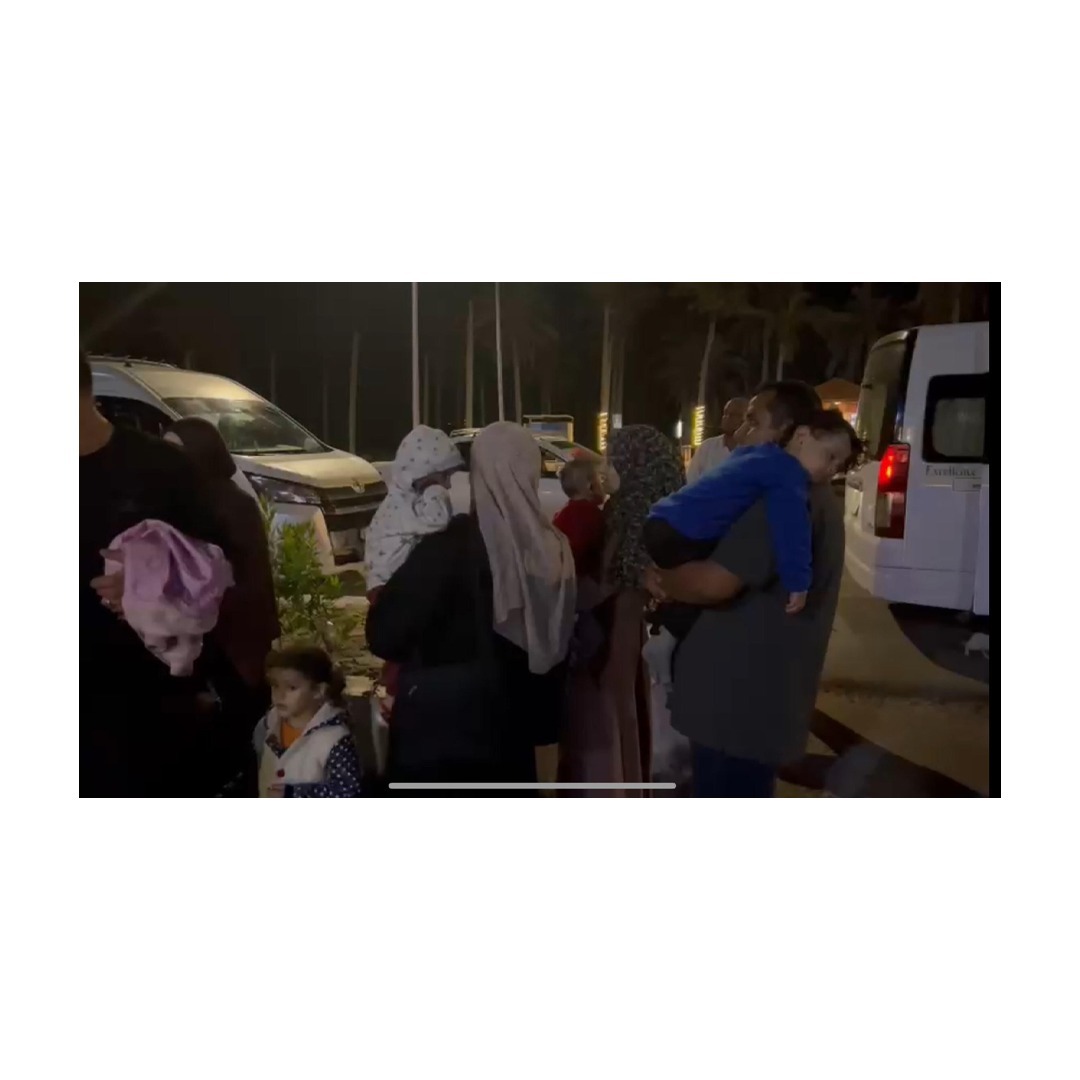 Palestinians with dual citizenship fleeing for their lives to Egypt via the Rafah Border Crossing — Photography by Ayat Al-Habbal
Palestinians with dual citizenship fleeing for their lives to Egypt via the Rafah Border Crossing — Photography by Ayat Al-Habbal
Left a part of myself there
Maram Salah Khalifa, a 29-year-old Palestinian woman from Gaza, is married to an Egyptian and mother to a 6-month-old Egyptian girl. Khalifa has documents indicating that her Egyptian travel documents are in process. She traveled to Gaza in mid-August this year, ahead of her brother's wedding which was scheduled for October 7. The festivities were called off after the war broke out.
Khalifa, a Rafah native, has been confined to her family's home since the beginning of the Israeli aggression. She has left the house only twice in the weeks since the war started, both times to the Rafah Border Crossing.
Her first attempt was a week after the war began. However, instead of crossing into Egypt, as she had hoped, she instead witnessed the shelling of the Crossing over two consecutive days. After it was announced that foreign nationals could use the Crossing to leave Gaza, Khalifa attempted her second exit. She was able to secure permission to leave Gaza with her daughter, who is an Egyptian citizen, through her father.
Maram escaped the bombardment around her house only to find more shelling at the crossing, “That day was like judgment day with all the horrors we saw; people were running in all directions trying to flee. I saw people jumping in any car that would take them”
She left behind 20 members of her family, living together under one roof in Rafah, surrounded by constant bombardment by the occupation forces. The house turned into a communal shelter, as other displaced individuals from Gaza City sheltered with them, turning the living room into a shared sleeping space and gathering together in an attempt to alleviate their shared fear.
During the time she was in the Gaza Strip, Khalifa’s husband, Hani Al-Shafi’i, appealed to the Egyptian authorities via social media to allow his wife and daughter to leave. During this time, he lost contact with them for days due to the frequent internet and electricity outages in Gaza.
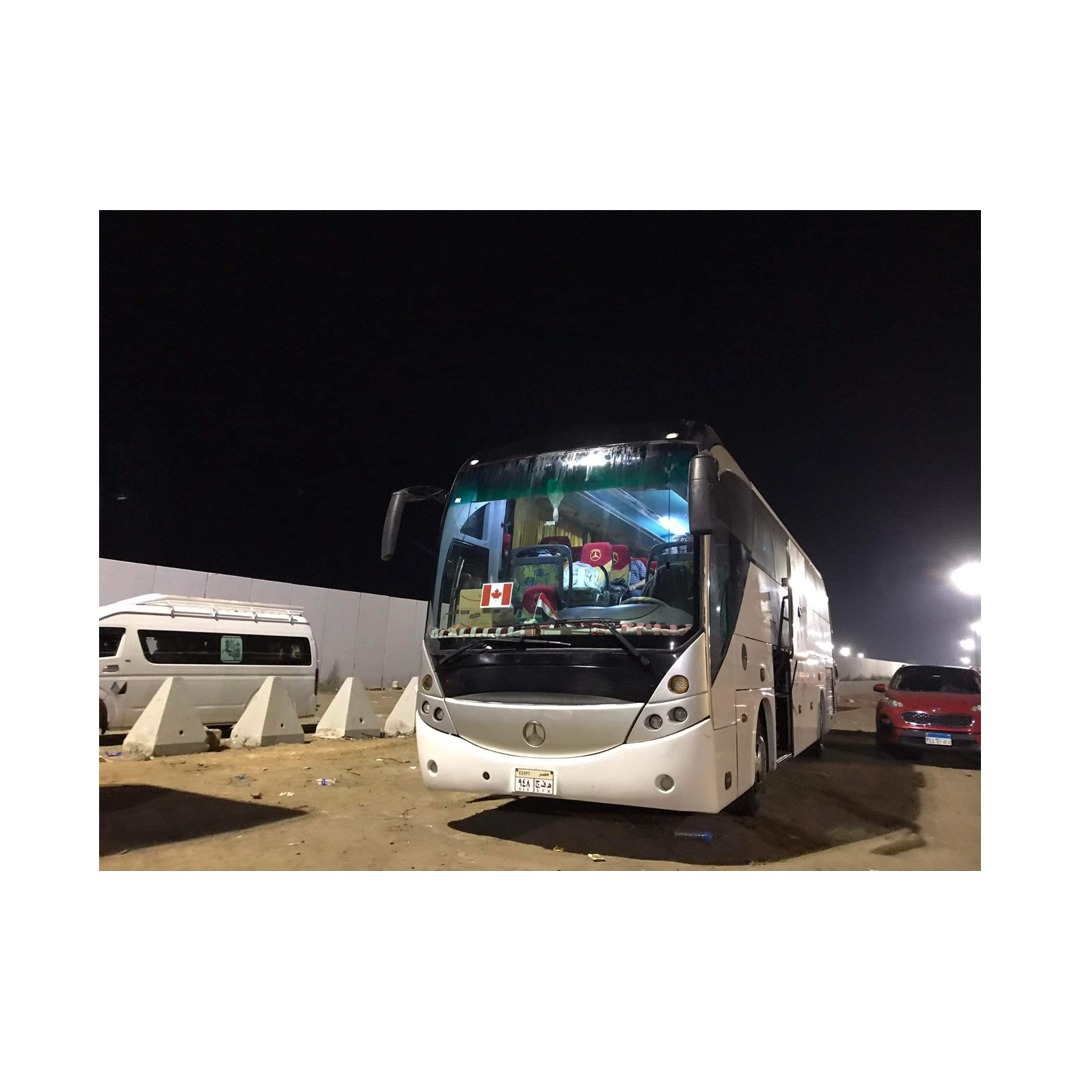 A bus transporting Palestinians who arrived in Egypt via the Rafah Border Crossing — Photography by Ayat Al-Habbal
A bus transporting Palestinians who arrived in Egypt via the Rafah Border Crossing — Photography by Ayat Al-Habbal
Describing the situation she left her family in, Khalifa told Raseef22, “Rafah, like other cities in Gaza, lacks the most basic necessities. There's no electricity, water, or sufficient food for the family.” Securing the basic needs and supplies for her and her daughter was “very difficult.” She was afraid for any member of her family leaving the house due to “random shelling in all areas of the Strip.” Khalifa shared, “Getting food and drink is hard. Even a can of beans is hard to come by, and the available water is unsuitable for drinking. Every day, we had to travel distances to fetch water, which was a huge risk.”
After the first week of the war, Khalifa found herself caught “between two fires.” She questioned whether to leave her family and flee across the border, or stay by their side under the bombardment
Palestinian and Egyptian authorities, along with the relevant foreign embassies and other international organizations, coordinated the exit of foreign nationals from Gaza. An Egyptian security official recently confirmed that Israeli authorities were involved when approving the names of individuals allowed to cross into Egypt. Names were added to lists, capped by a daily quota, as confirmed by everyone Raseef22 interviewed.
After the first week of the war, Khalifa found herself caught “between two fires.” She questioned whether to leave her family, or stay by their side.
She recounted her first journey to the Rafah border crossing, saying, “I risked my life to reach the crossing after a week of war. I went in a private car and raised a white flag to avoid the bombardment.”
At the time, Khalifa believed that her daughter and husband's Egyptian citizenships would be sufficient and allow her to cross into Egypt. However, her name was not on the list. She managed to enter the Crossing exceptionally, on the same day that the Palestinian side was being bombed.
She had just boarded the bus, ready to reach the Egyptian side of the Rafah Crossing. A report came through to officials on the Palestinian side to evacuate the Crossing. “They asked us to get off the bus and quickly head to the waiting hall as the crossing was being shelled. It was a terrifying moment; I can't even describe it.”
“In previous wars, there used to be a warning via a siren to allow residents to leave their homes before getting hit. But this time, there are no warnings”.. Khalifa has been worried about her family in Gaza ever since she returned to Egypt in mid-November
Khalifa headed to the waiting hall, spending the night there on a cold chair, awaiting the necessary repairs to reopen the Crossing. “We were told that the Egyptians would fix the damage.” The next day, she and the other passengers were transferred to a bus, in a second attempt to cross from the Palestinian side to the Egyptian side. The passengers boarded buses from 9 am to 12 pm, but as soon as the bus moved, the crossing was bombed again. This was on October 13, a few days after Operation Al-Aqsa Storm.
According to her, the passengers asked the driver to continue driving, but the stretch of road between the Egyptian and Palestinian sides of the Crossing was bombed, forcing them to return to the now-bombed waiting hall.
Khalifa was surrounded by shelling from all directions, having escaped the bombardment around her house only to find more shelling at the Crossing, “That day was like judgment day, with all the horrors we saw; people were running in all directions trying to find shelter. I saw everyone running, and the employees just left their posts, and people jumped in any car that could transport them to Rafah. We ran a long distance, with my daughter in my arms, until I found a car and it took me back to Rafah.”
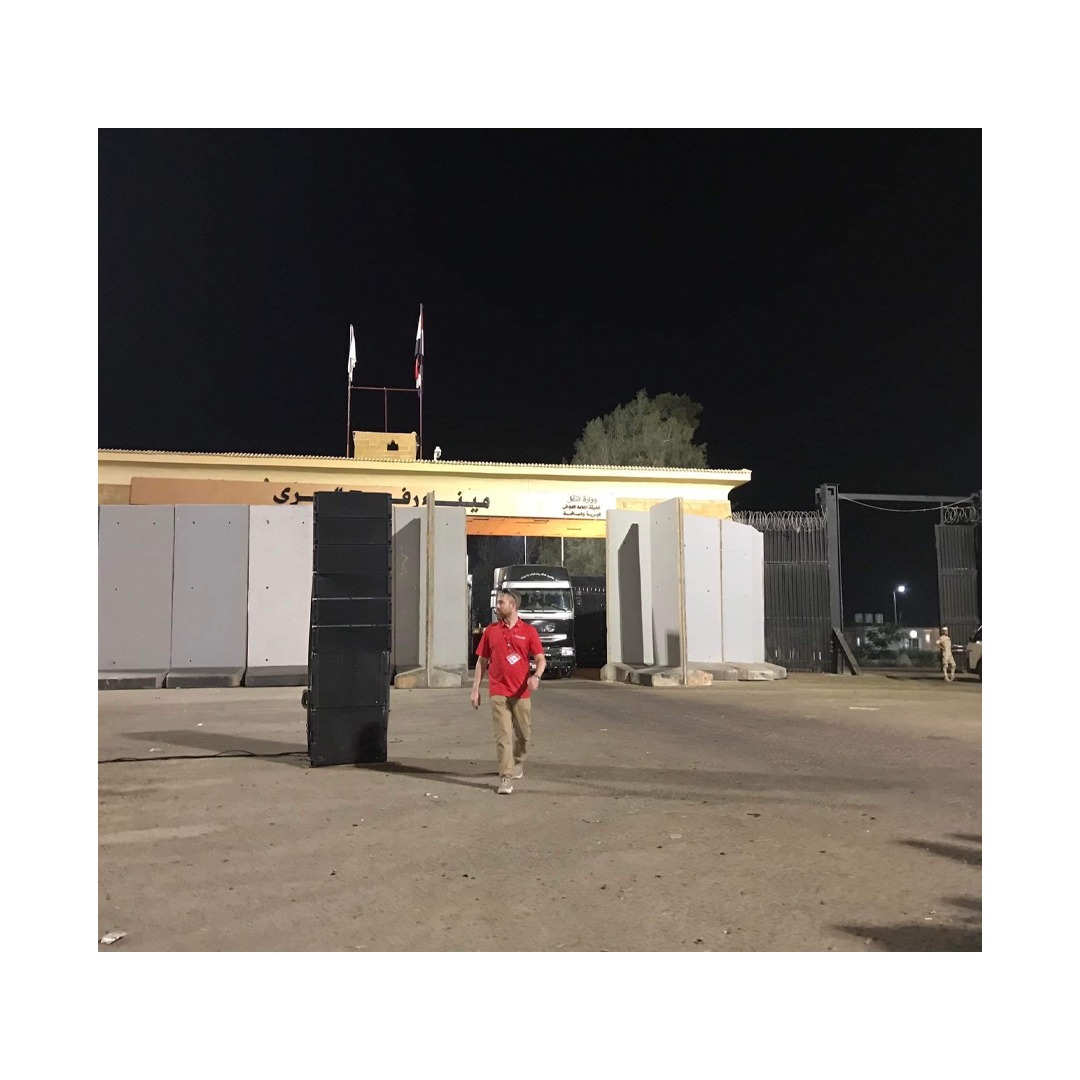 The Rafah Border Crossing — Photography by Ayat Al-Habbal
The Rafah Border Crossing — Photography by Ayat Al-Habbal
She returned to her family's home and together, they experienced the full brunt of the war. After a month, her name was finally added to the list of those allowed to cross into Egypt. She and her now-8-month-old daughter were finally able to return to Egypt safely.
“We've lived through horror unlike anything we’ve seen before. There's no rest or peace anymore.. I left just to ensure the safety of my children, but we will return because this is our land, and we won't abandon it” - A Palestinian at the Rafah Crossing
“In previous wars, there used to be a warning with a siren first to allow residents to leave their homes before getting hit. But this time, there are no warnings.” Khalifa is attached to her family in Gaza, and difficulty communicating has been her main concern since she returned to Egypt in mid-November. She contacts them through messaging apps like WhatsApp, and waits for their reply, often days later, or whenever they are able to charge their phones using solar power from neighboring homes that still stand. “I am close with my family, and I'm always worried about them. All that matters to me is that they are well and safe. I am currently waiting for a message from them just to know they are okay.”
“Every household in Gaza has experienced grief or loss.” Khalifa remembers the friend she lost, “she was set to come with me to Egypt, but her house was bombed, and she and her son died,” adding, “people cannot go on anymore; the most basic life necessities are not available, and sleep has decreased due to the intense bombing at night.”
The evacuation of foreigners from Gaza through the Rafah Border Crossing began on November 1. Approximately 7,000 holders of foreign passports and dual citizenship, along with their families, and a limited number of individuals in urgent need of medical treatment, have since been able to leave Gaza into Egypt.
— — — — — —
Photography by Ayat Al-Habbal
Raseef22 is a not for profit entity. Our focus is on quality journalism. Every contribution to the NasRaseef membership goes directly towards journalism production. We stand independent, not accepting corporate sponsorships, sponsored content or political funding.
Support our mission to keep Raseef22 available to all readers by clicking here!
Interested in writing with us? Check our pitch process here!
